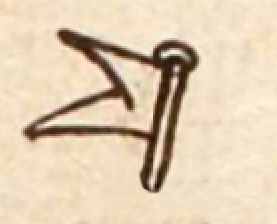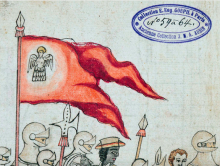panitl (Verg12v)
This black-line drawing of the element panitl (flag, banner) has been extracted from the compound Tlalticpaque. In that compound, it played a phonetic role, providing the sound for the syllable "pa." Here, we are repeating it as a logogram for flag. This flag is forked, having a "swallowtail" shape. This shows European influence, considering that autonomous-era flags were simply rectangular. This flag also flies to the viewer's left, leaning to the right slightly, and the pole to which it is attached has a cap on it, which also seems European.
Stephanie Wood
1539
Jeff Haskett-Wood
banderas, heráldica, siglo XVI
This representation of a banner carried in the Spanish invasion of Mexico comes from the Codex Azcatitlan. This image has been taken from one page; it is hosted by Wikimedia.

pan(itl), flag, banner, https://nahuatl.wired-humanities.org/content/panitl
la bandera
Stephanie Wood
Codex Vergara, folio 12v, https://gallica.bnf.fr/ark:/12148/btv1b84528032/f32.item.zoom
The non-commercial reuse of images from the Bibliothèque nationale de France is free as long as the user is in compliance with the legislation in force and provides the citation: “Source gallica.bnf.fr / Bibliothèque nationale de France” or “Source gallica.bnf.fr / BnF.” We would also appreciate a citation to the Visual Lexicon of Aztec Hieroglyphs, https://aztecglyphs.wired-humanities.org/.



